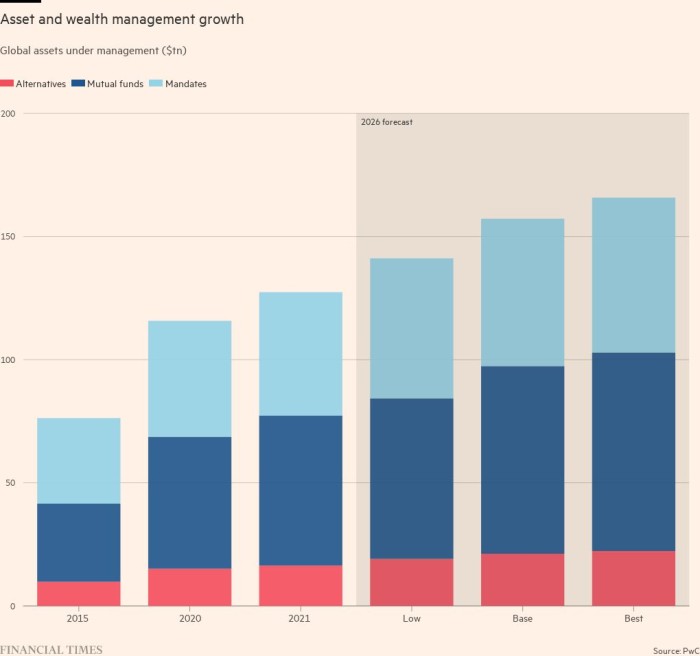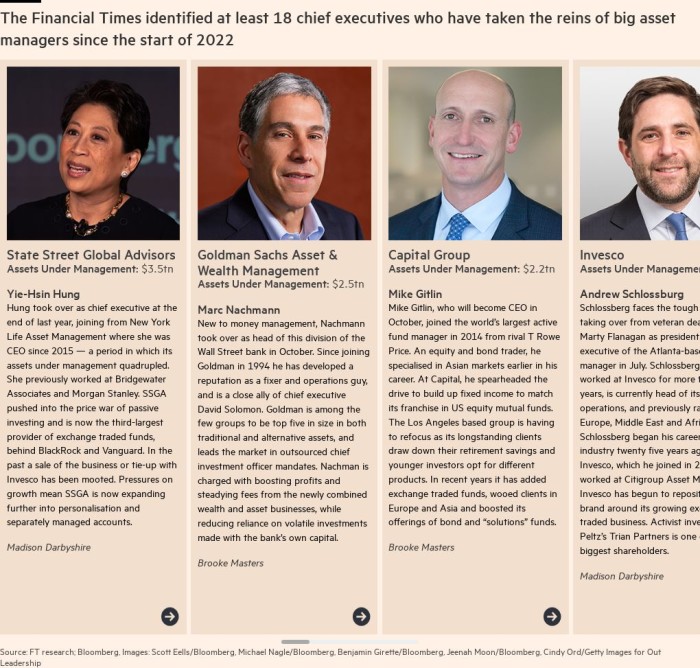A brand new technology of asset administration chief executives have known as time on a “golden decade” for his or her trade, warning that it’s turning into more and more tough to navigate the competing pressures of markets, regulators and politicians.
“The complexity of the calls for on an asset supervisor are clearly rising,” mentioned Ali Dibadj, chief government of Janus Henderson. “Purchasers are asking extra of all of us, regulators are asking extra from all of us, and our shoppers’ shoppers are asking extra from us.”
Katie Koch, chief government of Los Angeles-based TCW Group, mentioned asset managers had been “dealing with rising complexity round evolving regulation, migration of funding alternatives from public to non-public markets, globalisation of the chance set and the newer politically charged portfolio administration surroundings”.
After a decade of zero charges and quantitative easing that pushed fairness markets to report highs, traders are grappling with the problem of a regime change in direction of each larger inflation and better rates of interest.
“Asset administration was a rising tide that might elevate all boats and that’s not true,” mentioned Yie-Hsin Hung, chief government of State Road International Advisors.
The Monetary Instances recognized at the least 18 chief executives who’ve taken the reins of huge asset managers because the begin of 2022. This new guard is charged with stabilising their companies following the worst 12 months for the roughly $60tn trade because the monetary disaster.
Massive falls throughout markets mixed with investor outflows and spiralling prices, compounding strain on lively asset managers which were combating the march of passive investing.
Buyers globally pulled $530bn from funding funds (excluding short-term cash market funds) final 12 months, the fund trade’s worst for brand new enterprise since 2008, in keeping with information supplier Morningstar.
Funding managers’ revenues are underpinned by the charges they cost on belongings below administration, and falling belongings are placing cost-to-income ratios — a key measure of funding supervisor profitability — below strain, particularly for much less environment friendly gamers.
“The golden decade for asset administration is over,” mentioned Stefan Hoops, chief government of DWS, including that traders now confronted a market surroundings the place “not every thing goes up and up and up” however “prices are”.
Final week BlackRock, the world’s largest asset supervisor, warned that the “conventional investing strategy” of 60 per cent shares and 40 per cent fastened revenue will serve traders poorly over the long run, calling time on a technique that has been a cornerstone of many asset managers for greater than 30 years.
“The complexity of the markets proper now — not simply equities and bonds, however shopper behaviour, economics, geopolitics and regulation — is creating numerous volatility and uncertainty,” mentioned Andrew Schlossberg, chief government of Invesco. “That makes making a long-term enterprise technique difficult and we expect it’s going to be with us for some time.”
Asset managers have responded to profitability pressures by attempting to diversify their companies, including higher-margin merchandise resembling non-public belongings or focusing on new shopper varieties or geographic areas, typically by way of acquisitions. Their enterprise fashions have turn out to be more and more elaborate and tough to handle in consequence.
“The challenges of complexity are better than the challenges of scale,” mentioned Rob Sharps, chief government of T Rowe Worth. Clients now come to T Rowe by way of a number of channels, together with direct entry on brokerage platforms, by way of advisers or to purchase particular merchandise resembling alternate options. “Then we try this across the globe.”
He added: “It turns into a sophisticated enterprise particularly with the proliferation of regulation and completely different shopper preferences for automobiles, methods or constructions in finish markets.”
More and more fragmented and sophisticated regulation is one other space of concern, significantly across the fast-growing sector of investing on the premise of surroundings, social and governance elements. Asset managers try to stability the calls for of a extremely interconnected funding trade towards retreats from globalisation and the more and more politicised nature of ESG within the US.
“Regulation is turning into rather more difficult,” mentioned Matthew Beesley, chief government of Jupiter. “Regulatory pressures have elevated in each area. We’re additionally seeing regulatory divergences rising inside Europe following the UK’s exit from the EU.”
For instance, European regulators took a lead on defining requirements for ESG investing, with the Sustainable Finance Disclosure Regulation, which goals to enhance transparency and stop greenwashing. However the UK is consulting by itself model of guidelines, which may take a special strategy to the EU within the aftermath of Brexit, and the US Securities and Trade Fee is making ready guidelines round ESG disclosures.
Karin van Baardwijk, chief government of Dutch asset supervisor Robeco, mentioned that with the rising demand and related provide of ESG merchandise, “the danger of greenwashing is turning into extra prevalent. This could harm the credibility of our trade as an entire . . . and can finally result in extra regulation.”
Within the US, asset managers together with BlackRock and Vanguard are discovering themselves a lightning rod for each side of the political spectrum. Republican politicians are attacking them over using ESG metrics, contending that they’re hostile to fossil gasoline investments, whereas Democrats have criticised them for failing to do extra to battle local weather change.
In the meantime, asset managers are locked in a struggle for expertise, notably in areas resembling non-public belongings, expertise and sustainable investing, and attempting to maintain investing of their companies to remain forward of the competitors.
“The strain on value, inflation of wages, and the struggle on expertise is de facto right here to remain,” mentioned Naïm Abou-Jaoudé, chief government of NY Life Funding Administration.
“And the pressures we have now on regulation, compliance and all the necessities imply the enterprise is turning into extra demanding . . . all of that is costing rather a lot when it comes to funding to be actually environment friendly as an organisation.”
The chief executives all agreed that traders in the present day face a future fairly completely different from these of their predecessors in latest a long time.
To navigate this extra advanced surroundings asset managers will “must work tougher and be much more modern . . . working throughout conventional silos,” in keeping with Marc Nachmann, world head of asset and wealth administration at Goldman Sachs.
“Extra in depth relationships and sources — globally distributed and amplified by higher expertise — can be more and more wanted for thought technology, deal sourcing, portfolio building, and worth creation,” he mentioned. “These aren’t small investments to make.”









